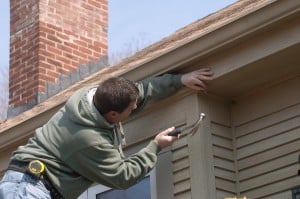We’ve all heard the saying “the joys of home ownership” and while owning a home can bring joy and satisfaction it is important to plan and be prepared for expenses. Owning a primary residence is one thing but when you own multiple properties the expenses can really start to add up. Anyone who successfully invests in real estate will tell you that you have to expect the unexpected and plan for the inevitable. We all know that things have a life span, that’s why we get to depreciate the value of our home at tax time. So, it’s important to save for the inevitable costs like painting, roofing, failing refrigerators, and HVAC systems to name a few.
There are ways to prevent or postpone an expense by simply maintaining your properties and fixing problems while they are small and easy to manage. Obviously, there are events that are quite literally unforeseeable, for instance that tree root that completely tore apart the underground sewage pipes outside the house. Most “unexpected” costs can be predicted and planned for. The best way to ward off issues is to do your maintenance; change the air filters or provide filters to tenants, clean the gutters, make sure that sinks and toilets aren’t leaking and rotting out the floor. Don’t let the maintenance slide in seek of a higher profit margin, in the end it will cost you money and if you plan on buying and holding a property this will not increase your profits. In addition, a poorly maintained property will sit vacant longer then a property that is well maintained.
If you’re planning to purchase a home always get it inspected (which is generally required when obtaining financing). Inspections will give you the information that you need to calculate for future expenses like the age of the roof, windows, heating system etc. they all have a life span and if they are near the end of it you have to budget for and plan on replacing those items. Knowing the condition of the home will also give you the information for negotiating the price. If a lot of work is going to be needed in the near future this is a bargaining chip that you need to use when coming up with a price to offer on the home. An inspection may also reveal information that will tell you if you should walk (or run) away from a home. If the property has foundation issues, outdated electrical, or plumbing it may be better to continue your search.
Investing in real estate can be intimidating because there are all sorts of things that can go wrong, sometimes the people issues are more of a problem and more unpredictable then repairs but we’ll save that topic for another blog. If you don’t have a background that has prepared you to make needed repairs or diagnosing issues it may be best to hire a professional. There are however a lot of resources out there if you do decide to tackle a repair or improvement at a property yourself. YouTube is a great resource for step by step instructions on how to fix things and I’ve used it myself many times. Books and advice from the local home improvement stores has also proved to be an invaluable resource. I’ve found that for small jobs that aren’t incredibly complex it’s worth my time to just complete the repair myself rather than hiring a contractor who will likely over charge because small jobs are inconvenient and don’t have as high of a profit margin for them.
Setting aside money for repairs is the best way to be prepared for expected or unexpected repairs. Calculating how many years you have left in a roof for instance and then estimating the replacement cost will give you a good idea of how much you need to set aside monthly or yearly to make that repair when it’s needed. If you are ever in a situation where you are over extended and don’t have the funds to make all the impending repairs then you need to prioritize what repairs need to be done first. Anything that allows water to touch the framing of the house should be prioritized because left un-repaired can cause mold, rot, and structural issues that are all expensive to re-mediate. Of course things that affect the livability of the property, if occupied, are a high priority such as heating in the winter and cooling in the summer.
What other ways do you prepare for unexpected repairs?
